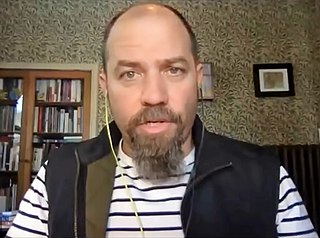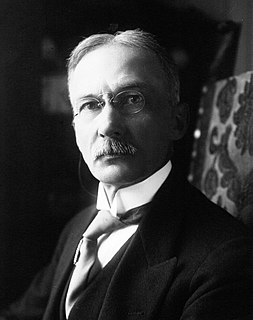A Quote by James K. A. Smith
Whenever science attempts to legitimate itself, it is no longer scientific but narrative, appealing to an orienting myth that is not susceptible to scientific legitimation.
Quote Topics
Related Quotes
Unfortunately, philosophers of science usually regard scientific realism and scientific anti-realism as monistic doctrines. The assumption is that there is one goal of all scientific inference - finding propositions that are true, or finding propositions that are predictively accurate. In fact, there are multiple goals. Sometimes realism is the right interpretation of a scientific problem, while at other times instrumentalism is.
We must not forget that when radium was discovered no one knew that it would prove useful in hospitals. The work was one of pure science. And this is a proof that scientific work must not be considered from the point of view of the direct usefulness of it. It must be done for itself, for the beauty of science, and then there is always the chance that a scientific discovery may become like the radium a benefit for humanity.
When people think science and cooking, they have no idea that it's not correctly expressed. We're actually applying the scientific method. People think chemistry and physics are science, but the scientific method is something else.... It's the science that the world of cooking generates: science of butter; science of the croissant.
We should stop the non-scientific, pseudo-scientific, and anti-scientific nonsense emanating from the right wing, and start demanding immediate action to reduce global warming and prevent catastrophic climate change that may be on our horizon now. We must not let the [Bush] Administration distort science and rewrite and manipulate scientific reports in other areas. We must not let it turn the Environmental Protection Agency into the Environmental Pollution Agency.
Almost all major scientific projects today are huge collaborations, yet we still have this public obsession with the idea of the individual scientific genius. One of my goals as a science communicator is to celebrate the collaborative dimensions of science, which I think will be critical for facing the ecological and resource challenges ahead. In a sense, we are all corals now.
It is this claim to a monopoly of meaning, rather than any special scientific doctrine, that makes science and religion look like competitors today. Scientism emerged not as the conclusion of scientific argument but as a chosen element in a worldview - a vision that attracted people by its contrast with what went before - which is, of course, how people very often do make such decisions, even ones that they afterwards call scientific.
[In] the realm of science, ... what we have achieved will be obsolete in ten, twenty or fifty years. That is the fate, indeed, that is the very meaning of scientific work. ... Every scientific "fulfillment" raises new "questions" and cries out to be surpassed rendered obsolete. Everyone who wishes to serve science has to resign himself to this.
The problem with intelligent-design theory, is not that it is false but that it is not falsifiable. Not being susceptible to contradicting evidence, it is not a testable hypothesis. Hence it is not a scientific but a creedal tenet - a matter of faith, unsuited to a public school's science curriculum.
The basic question that the 'new science' raises for our balance sheet is the issue of what scientific questions have not been asked for 500 years, which scientific risks have not been pursued. It raises the question of who has decided what scientific risks were worth taking, and what have been the consequences in terms of the power structures of the world.

































